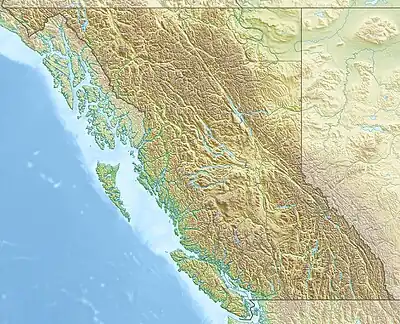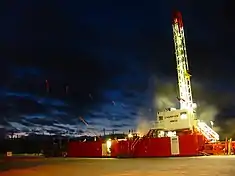| Greater Sierra (Sierra-Yoyo-Helmet-Desan) | |
|---|---|
 | |
| Country | Canada |
| Region | British Columbia |
| Offshore/onshore | onshore |
| Coordinates | 58°50′N 121°25′W / 58.833°N 121.417°W |
| Operators | Petrocanada, Husky Oil, Canadian Natural Resources |
| Field history | |
| Start of production | 2000s |
| Production | |
| Producing formations | Jean Marie, Muskwa, Horn River Formation |

Greater Sierra (also called Helmet Area) is a large oil and gas field in northeastern British Columbia, Canada. It is east and north from the town of Fort Nelson, extending to the Alberta and Northwest Territories borders (150 and 130km respectively).
It was discovered in 2002.[1]
Drilling rig activity takes place largely during the winter months, when the otherwise soft muskeg and boreal forest can be crossed on winter roads. Infrastructure is funded by a combination of private and public funds.[2]
Major projects tap in the large gas reservoirs hosted in Mississippian and Devonian limestones such as the Jean Marie Member of the Redknife Formation. More recent projects extract natural gas from the Muskwa Formation and Horn River Formation. Horizontal drilling and hydraulic fracturing techniques are used to extract the gas from the low permeability shales.[3][4]
Due to the large extent, the field is served by several airstrips (Helmet Airport, Fort Nelson/Mobil Sierra Airport, Fort Nelson Airport).
Companies with large interests in the area include Canadian Natural Resources and Petro-Canada.
See also
References
- ↑ Bott, Robert D. (2004). "Evolution Of Canada's oil and gas industry" (PDF). Energy BC.
- ↑ "Sierra Yoyo Desan Road". Government of British Columbia.
- ↑ "The Horn River Basin". Chinook Consulting.
- ↑ Bialowas, S. A.; Temple, C. A.; Aminu, M. O. (October 19, 2010). "Greater Sierra Jean Marie Tight Gas Carbonate: Multidisciplinary Approach Drives Decade of Development". Onepetro.org.